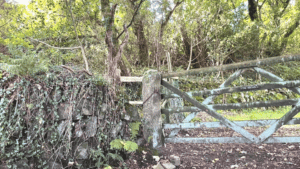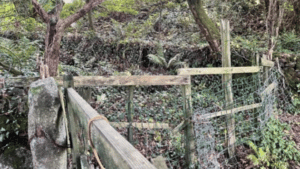Support us from £3/month
We deal with almost 1000 cases a year assisting communities, groups and individuals in protecting their local spaces and paths in all parts of England and Wales. Can you help us by joining as a member?
Open Spaces Society member, Hugh Gladden, recently wrote to the Cornish Times, expressing his disappointment at the council’s failure in its duty to prevent paths being obstructed. You can read his letter below.
Hundreds of landowners commit criminal offences, but Cornwall Council and its councillors look the other way.

Junction of Calstock footpath 22 and footpath 23 (grid reference SX 4178 7196). Pictured September 2022. Note – the gate shown in the picture was chained and padlocked when this picture was taken. Photo: Hugh Gladden
Under the Highways Act (1980) local authorities have a statutory duty to maintain public rights of way and to ensure that such rights of way remain open for the public to use. Wilfully obstructing a right of way, such as a footpath, is a criminal offence punishable by a term of imprisonment and/or a substantial fine. And yet Cornwall Council fails to curb landowners who obstruct footpaths, even though it is their legal duty to do so.
By the council’s own admission ‘a great number’ of footpaths (an informed estimation suggests in excess of eight hundred) throughout the county remain unlawfully obstructed, some of them for what the council admits are ‘decades’ – and yet Cornwall Council neglects to take the action required of it under the law against the landowners who are guilty of criminal offences.
Organisations such as the Open Spaces Society, the Ramblers Association and The British Horse Society are engaged in a constant struggle to pressure the council into action, but often must resort to the Courts to compel compliance. The council wriggles, twists, ducks and dives like a corporate spiv in order to avoid its responsibilities, usually citing ‘limited resources’ as an excuse.
Before anyone suggests it, this is not a choice between (for example) ‘social services or a few footpaths’: that would be an entirely false and misleading dichotomy. The maintenance of public rights of way is not just desirable and a good thing, but a statutory duty under the law. That duty is not optional – it is not an issue that can be negotiated away or put to one side in order to balance a budget – it is indisputably a legal obligation. To fail to perform it, whilst being fully aware that many landowners are breaking the law while you look the other way, amounts to collusion in multiple cases of criminal activity.
That a public authority should act (if such abject inaction can be so described…) in this way is disgraceful, and a scandal. In what other field of public service does the relevant authority –a body that ought to be setting an example – pick and choose which laws it finds it expedient to observe?

Calstock footpath 22, at the site of junction with footpath 23. Showing original track leading up to left of picture, now blocked by gate (chained and padlocked when this picture was taken) and makeshift fencing. Pictured September 2022. Photo: Hugh Gladden
This is not a trivial matter, but one that goes to the heart of our democratic freedoms. Today it is hundreds of footpaths that have been annexed with impunity – tomorrow it may be a neglected part of a common or a village green. And after that, who knows? Perhaps your back garden.
Why do we have laws if public servants, inept at best and arrogant at worst, decide to ignore them because it’s inconvenient to do what the law requires of them? And why should we tolerate landowners who block public rights of way for their own benefit, secure in the belief that Cornwall Council will obligingly look the other way while they do it?
It should be understood that it is not the fault of front-line staff that this disgraceful state of affairs exists. In my experience the individuals involved are unfailingly polite and friendly, and they seem to be doing the best they can within the system and constraints imposed upon them by the senior managers and the county councillors who must share responsibility for a deeply flawed policy.
Perhaps one solution would be if Cormac (the council’s delegated agent or ‘service provider’ in these matters) were paid according to how many paths they managed to have unblocked. I daresay that in that case, the ‘lack of resources’ would suddenly become a non-issue. Staff would quickly be reallocated or recruited, and the number of footpaths re-opened for public use would increase exponentially. If you’re going to use private enterprise and the profit motive to inspire greater efficiency for ratepayers, at least use it effectively so that the senior managers of agents such as Cormac really are incentivised to do their job, rather than just sitting around bemoaning the ‘lack of resources’ and inventing excuses, while waiting for the next handout of taxpayer’s money.
Ultimately, perhaps the solution is via the ballot box, and a vote for any candidate who undertakes to ensure that Cornwall Council fulfils its duties according to the law. But in the meantime, Cornwall Councillors – why not try asking the right questions at council meetings, and perhaps protesting about the kind of wideboy shenanigans outlined in this letter and carried out in your names? If you’re not already ashamed of your part in it, your really should be.
